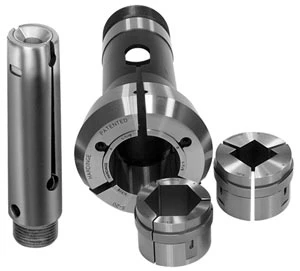
Should you consider using master collets and feed fingers instead of solid? Are you having trouble with slippage or marks on your workpiece? Can you really afford to purchase that ID pickoff attachment for your machine? You do have options.
MASTER COLLETS AND PADS
Overall, master collets and pads are less expensive to purchase than solid collets, are faster to change (pads only) and will take up less storage space. Hardinge Style-S master collets use interchangeable pads.
Hardinge's S-pads can be changed without removing the master collet from the spindle, reducing changeover time. When loading bars, the rugged shoulder of the pad locates against the front of the groove in the master collet. There are no set screws or clamps to be damaged or loosened. When a part is machined, the working forces are against the rear shoulder of the pad that is located against the rear shoulder of the groove in the master collet. The clamp that holds the pads in the collet literally floats longitudinally, assuring that there is never any pressure on the clamp. There are no holes in the OD of the master, or on the ID of the pads, resulting in maximum bearing on the workpiece and the spindle collet seat. Hardened pads are available in round, hex and square with smooth or serrated order holes and can be custom-made for extruded stock.
FEED FINGERS AND PADS
Hardinge Style-B feed fingers and pads are extremely dependable since there are no screws or pins to hold the pads in place. Pads cannot come loose and they offer full bearing on the bar stock. They are available in round, hex, square and custom shapes in a variety of materials and sizes to match your application.
Custom master feed fingers can be made for extremely light grip or heavier grip for nonstandard applications. Pads are available in different materials depending on the bar stock used.
Hardened steel pads are used for hotrolled and cold-drawn stock and are noted for long wear and minimized scoring of the steel. Nickel cast iron pads are for use on brass, aluminum, polished or plated bars, and specialfinish drawn bars to eliminate scoring of stock. Bronze pads are for ground drill rod, ground bars, and the materials previously listed for the nickel cast iron pads (excluding brass) to eliminate scoring of stock.
HQC QUICK-CHANGE COLLETS
Hardinge HQC Quick-Change Collets are available for older multi-spindle machines including Acme Gridley, Cone, New Britain and Wickman to increase productivity. Like master collets, the collet heads are interchangeable and change out in less than 20 seconds. The collet remains parallel to the stock even when there are variations in the stock size making them ideal for bar work. True parallel clamping minimizes stock "push back" and requires less draw bar force to achieve the same gripping capability as conventional collets.
Less draw bar force greatly reduces the breakage of the machine's closing fingers and pins that is common when the bar varies beyond the range of a standard solid collet. Higher feedrates and spindle speeds are possible.
Because of the extra gripping force, tool life increases and parts come off the machine quicker.
PICK-OFF (BURRING) COLLETS
Hardinge also stocks pickoff (burring) collets to fit all brands of machines.
Custom options include over-grip and ejector styles, collets for extruded shapes and special materials, and collets for stamping. Patented, ID pick-off collet assemblies are engineered by Hardinge for Euroturn, Gildemeister and Tornos Deco machines to fit in their standard OD pickoff attachments.
This custom pick-off collet eliminates the purchase and installation of a costly ID pickoff attachment from the machine builder.

Explore the July 2009 Issue
Check out more from this issue and find your next story to read.
Latest from Today's Medical Developments
- Arcline to sell Medical Manufacturing Technologies to Perimeter Solutions
- Decline in German machine tool orders bottoming out
- Analysis, trends, and forecasts for the future of additive manufacturing
- BlueForge Alliance Webinar Series Part III: Integrate Nationally, Catalyze Locally
- Robot orders accelerate in Q3
- Pro Shrink TubeChiller makes shrink-fit tool holding safer, easier
- Revolutionizing biocompatibility: The role of amnion in next-generation medical devices
- #56 Lunch + Learn Podcast with Techman Robot + AMET Inc.





